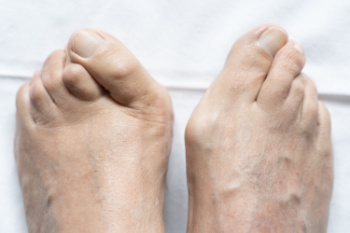
A bunion forms when the joint at the base of the big toe gradually shifts, creating a bony bump that can become sore, inflamed, and irritated by footwear. Podiatrists evaluate the degree of the deformity and tailor care to relieve discomfort and prevent it from worsening. Supportive shoes with ample toe space, cushioning to reduce rubbing, and custom orthotic inserts can help improve foot mechanics. Cold therapy and anti-inflammatory treatments may ease swelling and tenderness. In cases where pain limits activity or the bunion continues to progress, surgery may be recommended to realign the joint. Addressing the problem early often makes it easier to manage and helps maintain comfortable movement. If you have persistent pain or difficulty wearing shoes due to a bunion, it is suggested you arrange an appointment with a podiatrist for effective relief and management tips.
If you are suffering from bunions, contact Carrie Frame, DPM of West Virginia Foot & Ankle. Our doctor can provide the care you need to keep you pain-free and on your feet.
What Is a Bunion?
A bunion is formed of swollen tissue or an enlargement of boney growth, usually located at the base joint of the toe that connects to the foot. The swelling occurs due to the bones in the big toe shifting inward, which impacts the other toes of the foot. This causes the area around the base of the big toe to become inflamed and painful.
Why Do Bunions Form?
Genetics – Susceptibility to bunions are often hereditary
Stress on the feet – Poorly fitted and uncomfortable footwear that places stress on feet, such as heels, can worsen existing bunions
How Are Bunions Diagnosed?
Doctors often perform two tests – blood tests and x-rays – when trying to diagnose bunions, especially in the early stages of development. Blood tests help determine if the foot pain is being caused by something else, such as arthritis, while x-rays provide a clear picture of your bone structure to your doctor.
How Are Bunions Treated?
- Refrain from wearing heels or similar shoes that cause discomfort
- Select wider shoes that can provide more comfort and reduce pain
- Anti-inflammatory and pain management drugs
- Orthotics or foot inserts
- Surgery
If you have any questions, please feel free to contact our office located in Charleston, WV . We offer the newest diagnostic and treatment technologies for all your foot care needs.
